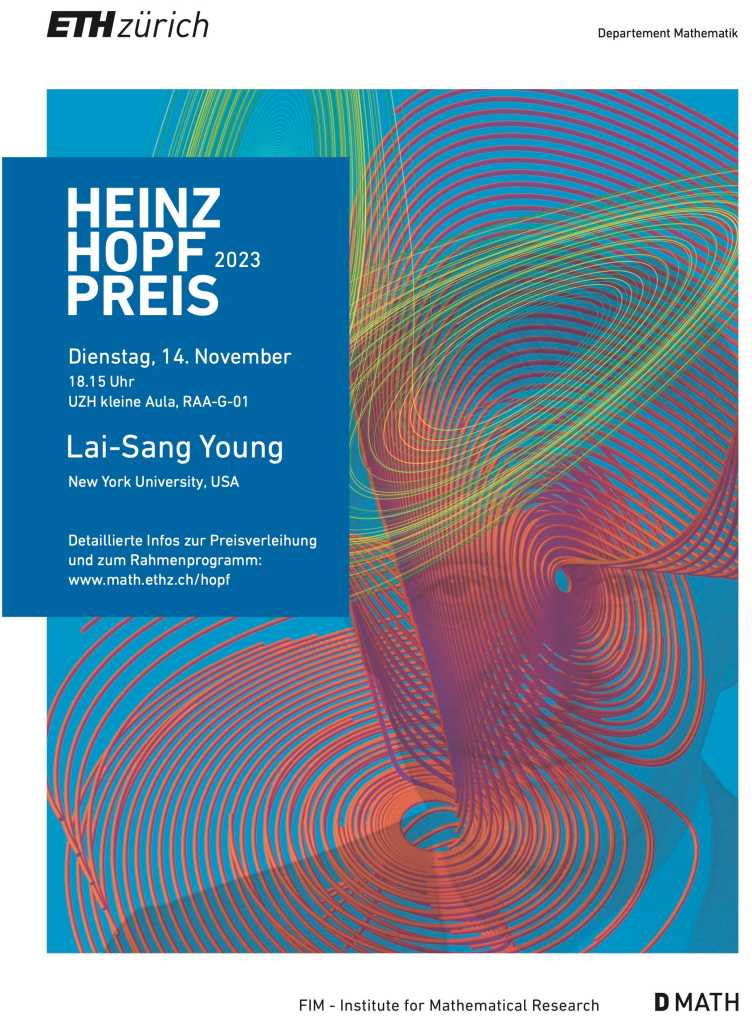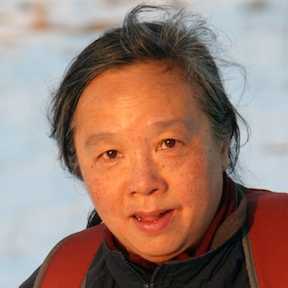Heinz Hopf Prize to a versatile dynamicist
On 14 November, the 2023 Heinz Hopf Prize was awarded to Lai-Sang Young, a leading dynamicist since the 1980s whose contributions range from chaotic systems to computational neuroscience.

Every two years, ETH Zurich awards the Heinz Hopf Prize for outstanding scientific work in the field of pure mathematics. Next week, Lai-Sang Young will be honoured for her contributions to a wide range of key developments in the theory and applications of dynamical systems, a branch of modern mathematics devoted to the study of the temporal evolution of natural and repetitious processes.
Born in Hong Kong, Young graduated from the University of Wisconsin, Madison in 1973 and received her PhD in mathematics from the University of California at Berkeley in 1978. After positions at Northwestern University, Michigan State University, the University of Arizona and the University of California at Los Angeles, she joined the Courant Institute of Mathematical Sciences at New York University in 1999, where she is the Henry & Lucy Moses Professor of Science. She has also been a Distinguished Visiting Professor at the Institute for Advanced Study in Princeton.
A handle on unpredictability
As she external page wrote in 1998, the study of dynamical systems as a mathematical discipline dates back to the quantitative study of celestial mechanics by Henri Poincaré in the 19th century. Since then, the subject has grown to encompass various areas of mathematics, including analysis, geometry, topology, probability and mathematical physics. This breath and the connections between fields also stand out as key aspects of Young's opus.

“The study of dynamical systems as a mathematical discipline dates back to the quantitative study of celestial mechanics by Henri Poincaré in the 19th century.”Lai-Sang Young
She is perhaps best known for her work on chaotic systems, which are dynamical systems that are exquisitely sensitive to initial conditions and whose dynamics are notoriously difficult to capture. Combining geometric and probabilistic approaches, she developed rigorous mathematical theories of chaotic systems. Among other contributions, the profound insight gained has helped to clarify the relationship between several fundamental concepts of such systems, such as Lyapunov exponents, entropy and fractal dimension. Part of this work are also systematic studies of so-called strange attractors – reflected in the design of the poster for the 2023 Heinz Hopf Prize.
In addition to abstract theories, Young's interests extend to concrete models. Important results concern the dynamics of so-called billiards, which deal with the motion of particles that are repeatedly bouncing off a boundary, much like the balls in the eponymous table game. The dynamics of such systems in generalised settings offer a wide range of intriguing and challenging problems. For example, a technique she developed, now known as 'Young towers', can be used to obtain results on how correlations decay in so-called dispersing billiards. The rapid decay of such correlations – the 'loss of memory', so to speak – is one of the hallmarks of unpredictability.
From billiards to brains
More recently, Young's interest has shifted to a very special dynamical system, "one of the most fascinating I have ever seen", as she recently said: the brain. She is currently working towards a mathematical model of the brain, and in particular on a biologically realistic computational model of the visual cortex, with the aim of gaining insight into human vision through the lens of mathematics.
Young's work has been recognised by numerous awards and honours, including the Ruth Lyttle Satter Prize in Mathematics from the American Mathematical Society (1993), a Faculty Award for Women in Science and Engineering from the National Science Foundation (1991–1996), a Guggenheim Fellowship (1997–1998), and election as a Fellow of the American Academy of Arts and Sciences (2004) and as a Member of the National Academy of Sciences (2020). She was an invited speaker at the International Congress of Mathematicians in 1994 and an invited plenary speaker at the same congress in 2018.
Honouring the memory of Heinz Hopf
Next week, Young will be awarded the 2023 Heinz Hopf Prize. Preceding the award ceremony on Tuesday, 14 November, she will give the first Heinz Hopf Lecture. A second lecture will follow on Wednesday, 15 November, as part of the Heinz Hopf Symposium (see box below).
The prize honours the memory of Professor Heinz Hopf (1894–1971), who came to ETH Zurich in 1931 to succeed the mathematician, physicist and philosopher Hermann Weyl. Hopf remained at ETH until 1965, where he made important contributions to various fields of mathematics, reflected in numerous entities named after him, among them Hopf invariants, Hopf algebras and Hopf links. The Heinz Hopf Prize was established by a generous donation from a former student of Hopf's, Alfred Aeppli (1928–2008) and his wife Dorothee. Since 2009, ETH Zurich has awarded the prize on the occasion of the long-standing biennial Heinz Hopf Lectures, which are now delivered by the Hopf Prize laureate.